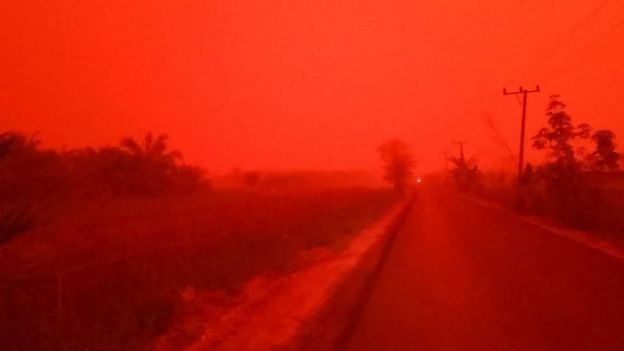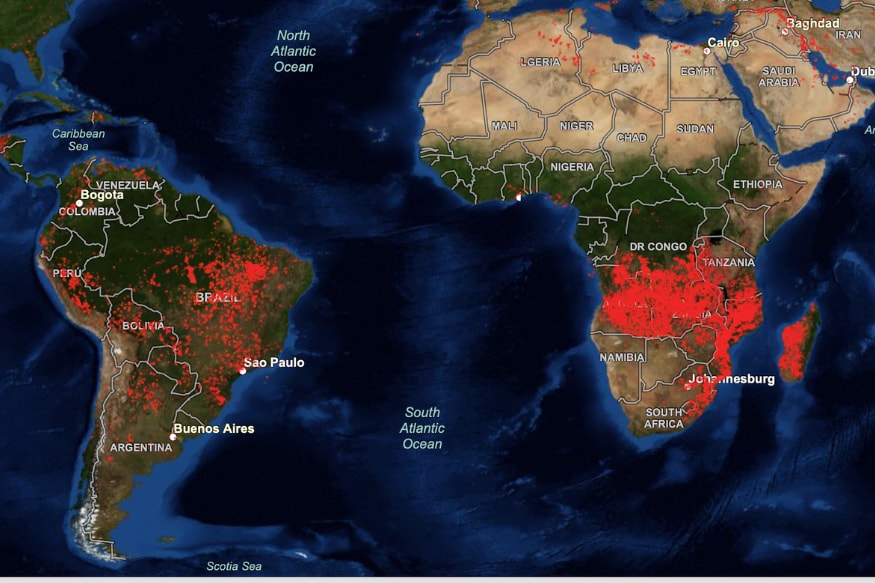- Details
 Forest fires in the Amazon released more energy than some of the world’s most polluting, according to a new study conducted by researchers at the University of Lancaster. Triggered by the 2015-2016 El Niño, a climate pattern that describes the unusual warming of surface waters in the eastern equatorial Pacific Ocean, 2.5 billion trees and plants emitted 495 million tonnes of CO2 from an area that makes up just 1.2% of the entire Amazon rainforest.
Forest fires in the Amazon released more energy than some of the world’s most polluting, according to a new study conducted by researchers at the University of Lancaster. Triggered by the 2015-2016 El Niño, a climate pattern that describes the unusual warming of surface waters in the eastern equatorial Pacific Ocean, 2.5 billion trees and plants emitted 495 million tonnes of CO2 from an area that makes up just 1.2% of the entire Amazon rainforest.
- Details
 While Australia enters in 2020 in the middle of its worst fire crisis, an omen of hope appears in the sky. The country where conservatives won elections by promising to support the carbon economy is now on its knees under the blows of a fire crisis triggered by climate change. While in the red-tinted sky of the fires, Rose Fletcher, a resident of southern Australia, captured a new year's image of the sky resembling the Aboriginal flag. In the middle of the catastrophe, an omen for a world in harmony with nature.
While Australia enters in 2020 in the middle of its worst fire crisis, an omen of hope appears in the sky. The country where conservatives won elections by promising to support the carbon economy is now on its knees under the blows of a fire crisis triggered by climate change. While in the red-tinted sky of the fires, Rose Fletcher, a resident of southern Australia, captured a new year's image of the sky resembling the Aboriginal flag. In the middle of the catastrophe, an omen for a world in harmony with nature.- Details
 Red is the sky, red is the earth. While smoke from forest fires in Indonesia often simply obscures visibility with a choking haze, parts of Sumatra island recently witnessed blood red skies due to the interaction of sunlight on particles from smoke in the air. A glowing red sky is seen in Kumpeh District in Muaro Jambi Regency, Indonesia in this still image obtained from a September 21, 2019 social media video. The images have been shot by a local student, Muhammad Dani, and they have not been manipulated.
Red is the sky, red is the earth. While smoke from forest fires in Indonesia often simply obscures visibility with a choking haze, parts of Sumatra island recently witnessed blood red skies due to the interaction of sunlight on particles from smoke in the air. A glowing red sky is seen in Kumpeh District in Muaro Jambi Regency, Indonesia in this still image obtained from a September 21, 2019 social media video. The images have been shot by a local student, Muhammad Dani, and they have not been manipulated.- Details

After Siberia and the Amazon, also the Congo Basin is now burning. Whiles governments across the world, the United Nations and environmental conservation groups continue to pile pressure on authorities to combat the fire, records by NASA indicated that two African countries were suffering more fire outbreaks than Brazil was: 6,902 fires in Angola, compared to 3,395 in the Democratic Republic of Congo and 2,127 in Brazil.
- Details
 The Brazilian president, Jair Bolsonaro, has accused environmental groups of setting fires in the Amazon as he tries to deflect growing international criticism of his failure to protect the world’s biggest rainforest. A surge of fires in several Amazonian states this month followed reports that farmers were feeling emboldened to clear land for crop fields and cattle ranches because the new Brazilian government was keen to open up the region to economic activity. Brazil has had more than 72,000 fire outbreaks so far this year, an 84% increase on the same period in 2018, according to the country’s National Institute for Space Research. More than half of them were in the Amazon.
The Brazilian president, Jair Bolsonaro, has accused environmental groups of setting fires in the Amazon as he tries to deflect growing international criticism of his failure to protect the world’s biggest rainforest. A surge of fires in several Amazonian states this month followed reports that farmers were feeling emboldened to clear land for crop fields and cattle ranches because the new Brazilian government was keen to open up the region to economic activity. Brazil has had more than 72,000 fire outbreaks so far this year, an 84% increase on the same period in 2018, according to the country’s National Institute for Space Research. More than half of them were in the Amazon.


